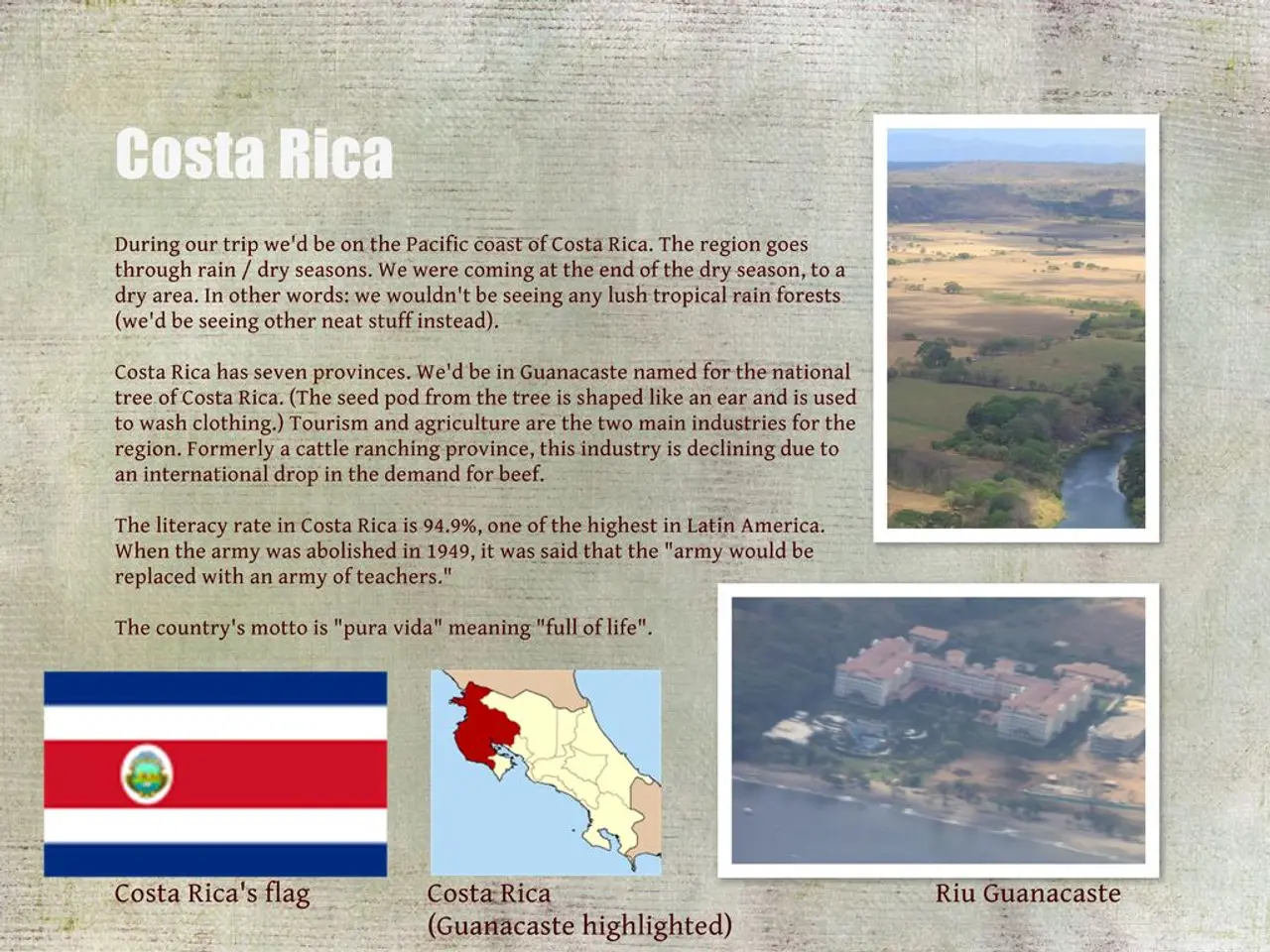In Ecuador, the arrival of drug cartels has transformed the nation into a war zone, with residents stating, "It has become a battlefield."
In the heart of Latin America, Ecuador is grappling with an alarming surge in violence and insecurity. A recent IPSOS report reveals that half of the country's population believes Ecuador is on the wrong track, with unemployment (74%) and insecurity, crime, and violence (58%) being the main concerns [1].
This escalating crisis can be traced back to the rapid expansion of drug trafficking organizations and gang violence. Ecuador's strategic location as a key transit point for cocaine has made it a battleground for competing cartels, leading to a dramatic increase in homicides. The national homicide rate has risen from 6 per 100,000 in 2018 to a staggering 38 per 100,000 in 2024, with over 4,600 homicides reported in the first half of 2025 alone [1][3][5].
This violence is causing deep societal impacts. Armed groups are forcibly displacing Indigenous communities, disrupting their lives and causing widespread harm. Economic and social stability is undermined in key provinces, with some authorities reportedly corrupt and unable or unwilling to effectively combat gangs [3]. The strain on state resources is evident, as despite states of emergency and anti-crime operations, violence persists with little reduction, signalling challenges in governance and law enforcement capacity [1][5].
Ecuador's elections and political environment are also being affected. Although specific impacts on elections are not detailed in the current reports, the violent insecurity is heightening political pressure on the government to act decisively. It risks undermining democratic processes by fostering fear, potentially limiting voter participation or skewing electoral dynamics due to instability. The violent insecurity may also influence public opinion and government legitimacy, as tough anti-crime measures become central political issues [1].
As Ecuador prepares for a second-round presidential election between President Daniel Noboa and Luisa González, the country's violent insecurity is a pressing concern for its citizens. Noboa's main electoral strategy, "Bukelize" the country, involves creating maximum security prisons, militarizing the country, and getting closer to Donald Trump. In contrast, González offers a return to the first stage of correísmo and a more important role for the State [2].
However, both candidates lack concrete measures for addressing Ecuador's violence and insecurity. Noboa's efforts to combat violence and drug trafficking have not shown significant results in the past two years [4]. The military has been deployed on the streets, and a curfew has been established at night in response to the escalating violence [4].
Ecuador's crisis extends beyond violence and insecurity, with the country also facing water and economic crises. Despite these challenges, the concern of Ecuador's citizens remains the violence and insecurity in their streets [1].
References:
[1] BBC News. (2025, May 1). Ecuador's violence crisis: 'It's a war'. BBC. https://www.bbc.com/news/world-latin-america-56933212
[2] The Guardian. (2025, April 30). Ecuador's presidential election: a battle between continuity and change. The Guardian. https://www.theguardian.com/world/2025/apr/30/ecuadors-presidential-election-a-battle-between-continuity-and-change
[3] Human Rights Watch. (2024, December 15). Ecuador: Rights Abuses by Security Forces in Anti-Drug Operations. Human Rights Watch. https://www.hrw.org/news/2024/12/15/ecuador-rights-abuses-security-forces-anti-drug-operations
[4] Reuters. (2025, May 1). Ecuador's Noboa declares 'internal armed conflict', labels drug gangs 'terrorist organizations'. Reuters. https://www.reuters.com/world/americas/ecuadors-noboa-declares-internal-armed-conflict-labels-drug-gangs-terrorist-2025-05-01/
[5] United Nations Development Programme. (2024). Human Development Report 2024: Ecuador. United Nations Development Programme. https://hdr.undp.org/en/countries/profiles/ECU
- The national homicide rate in Ecuador, a general concern among its citizens, has risen dramatically due to intensifying violent crime and insecurity, averaging a staggering 38 per 100,000 in 2024, making it a key issue in politics and the general-news.
- The escalating crisis in Ecuador, dominated by crime and justice concerns, threatens to undermine democratic processes, affecting the outcome of elections by potentially limiting voter participation or skewing electoral dynamics due to instability, as it becomes a central political issue.







